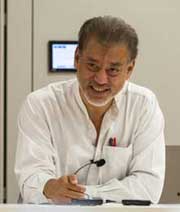ARTICLE AD
KUALA LUMPUR, Malaysia, Feb 25 (IPS) - Donald Trump’s Make America Great Again (MAGA) appeal captured US mass discontent against globalisation. In recent decades, variations of America First have reflected growing ethnonationalism in the world’s presumptive hegemon.
 Jomo Kwame SundaramDeglobalisation?
Trade liberalisation probably peaked at the end of the 20th century with the creation of the multilateral World Trade Organization (WTO), which the West kept outside the UN system.
Jomo Kwame SundaramDeglobalisation?
Trade liberalisation probably peaked at the end of the 20th century with the creation of the multilateral World Trade Organization (WTO), which the West kept outside the UN system. With deindustrialisation in the North blamed on globalisation, their governments gradually abandoned trade liberalisation, especially after the 2008 global financial crisis.
Free trade mahaguru Jagdish Bhagwati has long complained of the weak commitment to multilateral trade liberalisation. Most recent supposed free trade agreements (FTAs) have been plurilateral or bilateral, undermining multilateralism while promoting non-trade measures.
The new geoeconomics and geopolitics have undermined the rules and norms supporting multilateralism. This has undermined confidence in the rules of the game, encouraging individualistic opportunism and subverting collective action.
Policymaking has become more problematic as it can no longer count on agreed-shared rules and norms, undermining sustained international cooperation. Biased and often inappropriate economic policies and institutions have only made things worse.
Successive Washington administrations’ unilateral changes in policies, rules and conventions have also undermined confidence in US-dominated international economic arrangements, including the Bretton Woods institutions.
Deliberate contraction Although recent inflation has been mainly due to supply-side disruptions, Western central banks have imposed contractionary demand-side macroeconomic policies by raising interest rates and pursuing fiscal austerity.
US Federal Reserve interest rate hikes from early 2022 have been unnecessary and inappropriate. Squeezing consumption and investment demand with higher interest rates cannot and does not address supply-side disruptions and contractions.
After earlier ‘quantitative easing’ encouraged much more commercial borrowing, higher Western central bank interest rates were contractionary and regressive. Hence, much of world economic stagnation now is due to Western policies.
Developing countries have long known that international economic institutions and arrangements are biased against them. Believing they have no opportunity for wide-ranging reform, most authorities are resigned to only using available macroeconomic policy space.
Nevertheless, national authorities have become more willing to undertake previously unacceptable measures. For example, several conservative central banks deployed ‘monetary financing’ of government spending to cope with the pandemic, lending directly to government treasuries without market intermediation.
More recently, central banks in Japan, China, and some Southeast Asian countries refused to raise interest rates in concert with the West. Instead, they sought and found new policy space, helping to mitigate contractionary international economic pressures. Nonetheless, many economists piously urged central banks worldwide to raise interest rates until mid-2024. Meanwhile, policy pressures for fiscal austerity continue, worsening conditions for billions.
Neoliberal? To secure support for neoliberal reforms from the late 20th century, the Global North promised developing countries greater market access and export opportunities.
However, trade liberalisation has slowly reversed since the World Trade Organization (WTO) creation in 1995. Policy reversals have become more blatant since the 2008 global financial crisis with geopolitically driven sanctions and weaponisation of trade.
But ‘neoliberal’ globalisation was a misnomer, as there was little liberal about it beyond selective trade liberalisation. Instead, FTAs have mainly strengthened and extended property and contract rights, i.e., selectively interpreting and enforcing international law.
Trade liberalisation undermined earlier selective protectionism, which promoted food security and industrialisation in developing countries. Tariffs have also been crucial revenue sources, especially for the poorest countries.
Intellectual property Strengthening the rule of law has rarely fostered liberal markets. Even 19th-century economic liberals recognise the inevitable wealth concentration due to selective and partial neoliberalism.
Property rights invariably strengthen monopoly privileges under various pretexts. Global North governments now believe control of technology is key to world dominance. The WTO’s trade-related intellectual property rights (TRIPS) have greatly strengthened IP enforcement.
With IP more lucrative, corporations have less incentive to share or transfer technology. With TRIPS enforced from 1995, technology transfer to developing countries has declined, further undermining development prospects.
The 2001 public health exception to TRIPS could not overcome IP obstacles to ensure affordable COVID-19 tests, protective equipment, vaccines and therapies during the COVID-19 pandemic, even triggering criticisms of ‘vaccine apartheid’.
Weaponising economics The West has increasingly deployed economic sanctions, which are illegal without UN Security Council mandates. Meanwhile, access to trade, investment, finance and technology has become increasingly weaponised.
Foreign direct investment was supposed to sustain growth in developing countries. Intensifying Obama-initiated efforts to undermine China, then-President Trump and Japanese Prime Minister Abe Shinzo urged ‘reshoring’, i.e., investing in investors’ own countries instead.
Initial attempts to invest in their own economies instead of China largely failed. However, later efforts to undermine China have been more successful, notably ‘friend-shoring’, which urges companies to invest in politically allied or friendly countries instead.
With more economic stagnation, geopolitical strategic considerations and weaponisation of economic policies, cooperation and institutions, fewer resources are available for growth, equity and sustainability. Thus, the new geopolitics has jeopardised prospects for sustainable development.
IPS UN Bureau
Follow @IPSNewsUNBureau
Follow IPS News UN Bureau on Instagram
© Inter Press Service (2025) — All Rights Reserved. Original source: Inter Press Service

 5 hours ago
4
5 hours ago
4 
